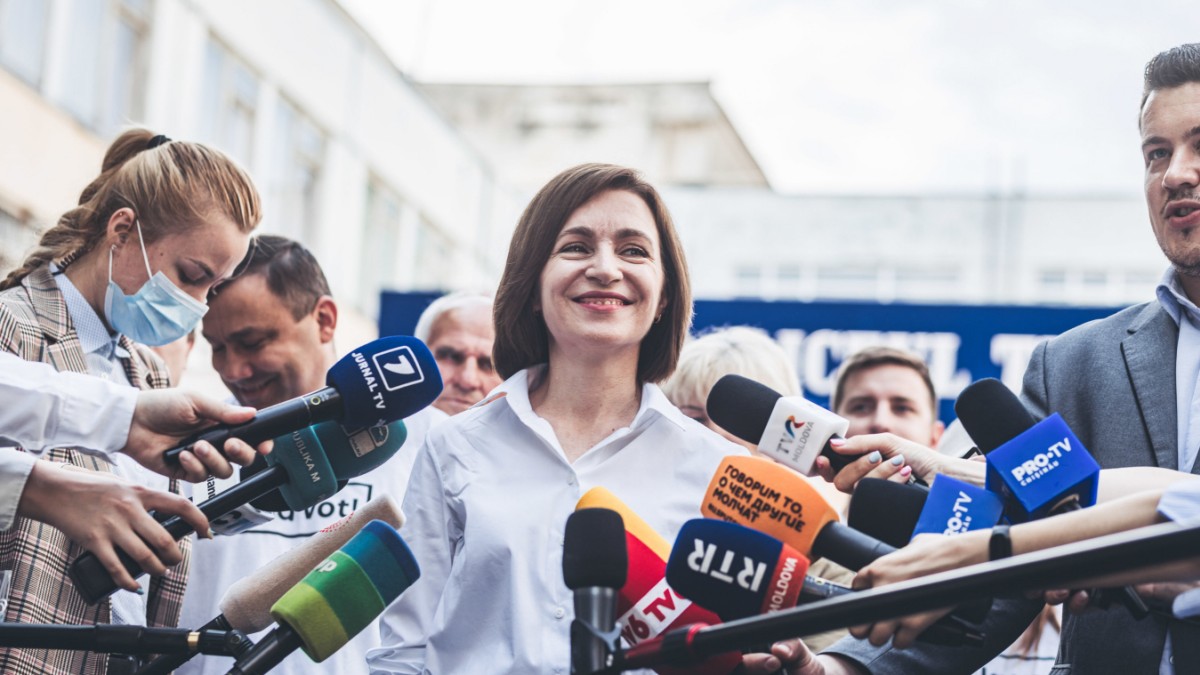Her victory in court in the fight for early elections has paid off for the president. In the parliamentary elections in Moldova on Sunday, Maia Sandu’s party won the most votes by a clear margin. Almost 53 percent got the action and solidarity (Pas), significantly more than communists and socialists (about 27 percent) and the smaller Şor party. After her presidency, Sandu now has the hoped-for absolute majority in the House of Representatives and thus the support for her European reform course.
30 years after independence began in the former Soviet republic, the camp of the former World Bank economist is striving for more transparency in politics and the judiciary. Sandu wants to end a system that was characterized by corruption and powerful oligarchs, in which the interests of politics and business were often extremely intertwined. With the previous parliament, President Sandu had no hope of improvement. “Today citizens can rid themselves of thieves and vote for an honest parliament,” she said on Sunday during the vote.
The Republic of Moldova, an impoverished country between Romania and Ukraine, has moved closer to the West and sometimes to Russia in the past few decades. She has an association agreement with the European Union, but the European course has been slowed down by an increasingly unpopular government, accused by critics and a large part of the population of mismanagement. The European Union did this and blocked further aid. MEPs from the now split-up officially pro-European but hated Democratic Party were, however, represented in the Moldovan parliament until now, in which the pro-Russian socialists formed the strongest faction. Until election Sunday.
Igor Dodon, head of the socialists and at the same time Sandu’s predecessor as president, admitted the defeat on Monday and congratulated Sandu on her success. “Such are the rules of democracy. You have all the power now.”
Many Moldovans living abroad vote for Sandu’s party
Maia Sandu, who also speaks Russian, has repeatedly emphasized that she is less concerned with geopolitics than with an honest, democratic, transparent state with an independent judiciary that takes care of a better standard of living for the people. And that she also wants good relations with Moscow. Their west course is clearly recognizable, however. This has been easy to follow on her Twitter account over the past few weeks: her visit to Italy, her thanks to Brussels for 600 million euros in aid in the fight against the economic crisis and the pandemic, her thanks to Germany and the EU for medical support. And in Poland she recently expressly sought support in moving closer to the EU. The US, on the other hand, is now supplying Moldova with half a million vaccine doses from Johnson & Johnson, while Sandu’s rival Dodon negotiated vaccines from Russia during his visits to Moscow.
Renata Alt, FDP member of the Bundestag, responsible for Central Eastern and South Eastern Europe in the Foreign Affairs Committee, said the Republic of Moldova now needs EU support in the fight against corruption and in the reforms. “The opportunity is favorable and should be used.” Russia could “let the frozen conflict over Transnistria flare up again at any time”.
The breakaway region is under the influence of Moscow, which has had soldiers stationed there since the 1990s. On the other hand, even from Transnistria, the majority of exports now go to the European Union, usually via Moldova and neighboring Romania.
A large share of the absolute majority – the Pas receives 63 out of 101 seats – should have the votes of the approximately one million Moldovans who emigrated abroad because of the precarious conditions. Most of them live in the west and rely on Maia Sandu to manage to stabilize the country. She now has the majority for it.
.
Kingston is an accomplished author and journalist, known for his in-depth and engaging writing on sports. He currently works as a writer at 247 News Agency, where he has established himself as a respected voice in the sports industry.












